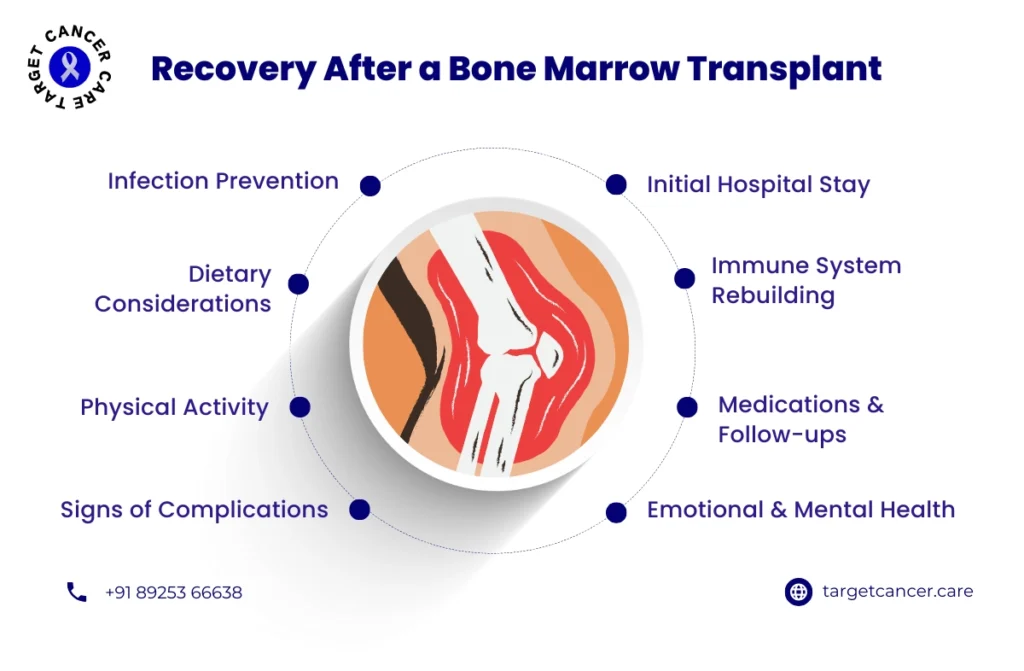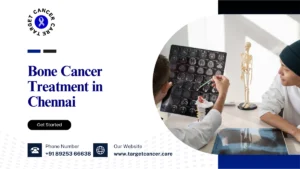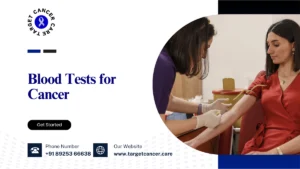Bone marrow is the soft, spongy tissue found inside bones where vital blood components—red cells, white cells, and platelets—are produced. When this marrow is damaged or diseased due to conditions like leukemia, lymphoma, or aplastic anemia, a transplant becomes a life-saving option. Bone Marrow Transplant in Chennai has advanced remarkably, offering patients access to experienced specialists, state-of-the-art technology, and compassionate care. At Target Cancer Care, each transplant journey is crafted with precision and empathy, helping patients reclaim their health. The certification and expertise behind every transplant ensure enhanced survival outcomes, fewer complications, and improved quality of life.
What is Bone Marrow?
Bone marrow is a soft, spongy tissue found inside certain bones such as the hip and thigh bones. It plays a crucial role in producing blood cells essential for life.
- Hematopoietic Function: Bone marrow contains stem cells that mature into red blood cells (which carry oxygen), white blood cells (which fight infection), and platelets (which help in clotting).
- Types of Bone Marrow:
- Red Marrow: Active in blood cell production and found mainly in flat bones.
- Yellow Marrow: Composed mostly of fat cells, found in long bones, and can convert to red marrow in cases of severe blood loss.
Healthy bone marrow is vital for immunity, oxygen transport, and healing processes. Disorders affecting bone marrow can severely compromise these functions and may necessitate advanced interventions such as a Bone Marrow Transplant in Chennai.
What is a Bone Marrow Transplant?
A bone marrow transplant (BMT) is a medical procedure where damaged or diseased bone marrow is replaced with healthy stem cells. This therapy can either come from the patient (autologous) or a donor (allogeneic).
- Purpose of Transplantation: To restore normal blood cell production in individuals whose marrow has been destroyed due to disease or high-dose chemotherapy.
- Process Involved:
- High-dose chemotherapy or radiation to eliminate damaged marrow.
- Infusion of healthy stem cells to regenerate functional bone marrow.
- This is considered a life-saving procedure in cases of blood cancers, genetic disorders, or severe bone marrow failure.
Hospitals offering bone marrow transplant in Chennai follow international protocols for donor matching, patient preparation, and post-transplant monitoring to ensure successful outcomes.

What are the Diseases for Which It Can Be Effective?
Bone marrow or stem cell transplant in Chennai is effective in treating a variety of malignant and non-malignant conditions affecting the blood, bone marrow, or immune system.
Malignant Conditions
- Leukemia: Both acute and chronic types, especially when chemotherapy alone is not sufficient.
- Lymphoma: Particularly Hodgkin and non-Hodgkin lymphoma that has relapsed or is resistant to treatment.
- Multiple Myeloma: A plasma cell cancer where autologous transplant can extend remission periods.
Non-Malignant Conditions
- Aplastic Anemia: A life-threatening condition where the marrow fails to produce enough blood cells.
- Thalassemia and Sickle Cell Disease: Genetic disorders where healthy donor marrow can correct defective hemoglobin production.
- Severe Immunodeficiency Disorders: Such as SCID (Severe Combined Immunodeficiency), where the immune system cannot function properly without intervention.
The best bone marrow transplant in Chennai is often delivered at multi-specialty hospitals with experienced hematologists, oncologists, and transplant teams that personalize treatment to the patient’s condition.
Types of Stem Cell Transplant
Stem cell transplants can be classified based on the source of stem cells and the donor. Understanding these types helps determine the best approach depending on the patient’s condition and availability of a donor.
Main Types of Transplants
- Autologous Stem Cell Transplant:
- In this procedure, the patient’s own stem cells are collected, preserved, and later re-infused after high-dose chemotherapy or radiation.
- Commonly used in cases of multiple myeloma or relapsed lymphoma.
- Reduces the risk of graft-versus-host disease (GVHD).
- Allogeneic Stem Cell Transplant:
- Stem cells are obtained from a donor, either a sibling or an unrelated matched donor.
- Used for diseases like leukemia or aplastic anemia where the bone marrow is severely damaged.
- Requires a close HLA (human leukocyte antigen) match to reduce complications.
- Haploidentical Transplant:
- Involves using a partially matched family donor, such as a parent or sibling.
- Useful when a fully matched donor is not available.
- This method is increasingly adopted in centers offering stem cell transplant in Chennai.
- Umbilical Cord Blood Transplant:
- Stem cells are harvested from donated umbilical cord blood after childbirth.
- Effective in pediatric cases and when adult donors are unavailable.
Modern medical facilities offering the best bone marrow transplant in Chennai are equipped to perform all these types with advanced HLA-matching and post-transplant care systems.
What to Expect During and After the Bone Marrow Transplant Procedure
A bone marrow transplant is a complex medical procedure that spans several stages — from preparation to recovery. Knowing what to expect can ease anxiety and support better emotional preparedness.
Before the Procedure
- Pre-transplant Evaluation: Comprehensive tests, including blood tests, heart and lung function evaluations, imaging studies, and bone marrow biopsies, are conducted to assess fitness.
- Conditioning Treatment: The patient undergoes high-dose chemotherapy and sometimes radiation therapy to destroy diseased cells and suppress the immune system for donor acceptance.
During the Procedure
- The healthy stem cells are infused into the patient’s bloodstream via a central venous catheter, much like a blood transfusion.
- The process is typically painless and does not require anesthesia.
After the Procedure
- Engraftment Phase: It takes about 2 to 4 weeks for the transplanted stem cells to start producing healthy blood cells.
- Isolation and Monitoring: Patients are kept in protective isolation to prevent infections due to low immunity. Blood counts are monitored daily.
- Medications: Antivirals, antibiotics, and immune-suppressive drugs are administered to prevent complications like GVHD.
Hospitals performing bone marrow transplant in Chennai ensure thorough post-transplant care, nutritional support, and psychosocial counseling to promote faster recovery and better outcomes.
Side Effects of Bone Marrow Transplant
While bone marrow transplants can be life-saving, they are associated with several short-term and long-term side effects that vary based on the type of transplant and patient’s condition.
Common Side Effects
- Nausea, Vomiting, and Fatigue: Caused by conditioning treatments like chemotherapy or radiation.
- Mouth Sores and Hair Loss: These are temporary but common during the engraftment phase.
- Infections: Due to weakened immune response post-transplant, bacterial, viral, or fungal infections are a significant concern.
- Bleeding and Anemia: Occur due to low platelet and red blood cell counts before engraftment is complete.
Serious Complications
- Graft-versus-Host Disease (GVHD): Occurs when donor immune cells attack the patient’s tissues. It can affect the skin, liver, and gut.
- Organ Damage: Liver, lungs, or kidneys may be impacted due to toxicity from chemotherapy.
- Delayed Recovery: Some patients may take months to regain full immune function and energy levels.
Experienced centers offering the best bone marrow transplant in Chennai have dedicated transplant units with infectious disease specialists, oncologists, and nutritionists to manage these side effects proactively and ensure safe recovery.
What Can I Do to Help Myself?
Recovery after a bone marrow transplant is gradual and requires physical, emotional, and lifestyle adjustments. Patients and caregivers play a vital role in improving outcomes and preventing complications.
Ways to Support Recovery:
- Follow Medical Instructions Strictly: Take all prescribed medications, including immunosuppressants, antivirals, and antifungals. Never skip follow-up visits with the transplant team.
- Practice Good Hygiene: Wash hands regularly, avoid raw or undercooked foods, and maintain a clean living environment to reduce infection risk during immune suppression.
- Nutritional Care: Eat a balanced diet rich in protein, iron, and vitamins. Registered dietitians in leading hospitals offering bone marrow transplant in Chennai provide customized nutrition plans.
- Stay Physically Active (Gradually): Engage in light exercise like walking to rebuild strength and stamina but avoid strenuous activity until cleared by your doctor.
- Mental Health Support: Emotional stress, anxiety, or depression is common post-transplant. Speak to counselors or join patient support groups.
Taking an active role in your recovery fosters better physical and psychological well-being during the critical post-transplant phase.
Affordable and Effective Ways for Bone Marrow Transplant
Bone marrow transplant is a highly specialized procedure, but it is becoming more accessible and affordable in India, particularly in Chennai, due to medical advancements and growing infrastructure.
How to Make BMT More Affordable:
- Choose Accredited Hospitals in Chennai: Several NABH-accredited hospitals offer affordable bone marrow transplant in Chennai without compromising on safety or success rates.
- Government & NGO Support: Patients may be eligible for schemes like the CMCHIS (Chief Minister’s Comprehensive Health Insurance Scheme) or support from foundations that subsidize transplant costs.
- Generic Medications and Bulk Procurement: Using cost-effective medications for post-transplant care, sourced through hospital pharmacies, helps reduce long-term expenses.
- Medical Tourism Advantage: Chennai is a preferred destination for medical tourists due to its combination of international-quality care and relatively lower prices compared to Western countries.
Hospitals offering stem cell transplant in Chennai also provide package-based pricing, minimizing financial unpredictability for patients and families.
Cost Comparison of Bone Marrow Transplant
Understanding the bone marrow transplant cost in Chennai helps families plan financially and assess hospital options based on services provided. The cost varies based on transplant type, duration of stay, and post-operative needs.
Autologous Transplant Cost:
- This type is usually less expensive since it uses the patient’s own cells, avoiding donor registry costs.
- The cost of bone marrow transplant in Chennai for an autologous transplant ranges from ₹10 to ₹15 lakhs in major hospitals.
Allogeneic Transplant Cost:
- Involves additional steps such as donor matching, graft-versus-host disease (GVHD) management, and extended monitoring.
- The bone marrow transplant cost in Chennai for allogeneic procedures typically ranges from ₹18 to ₹25 lakhs or more, depending on complications and hospital stay duration.
Comparative Analysis:
- India (Chennai): ₹10–₹25 lakhs
- USA/UK: ₹70 lakhs to ₹1.5 crores ($90,000 to $200,000+)
- Middle East & Southeast Asia: ₹30 to ₹60 lakhs
With a robust clinical framework and skilled transplant experts, Chennai offers one of the best value propositions for patients seeking high-quality care with a more manageable cost of bone marrow transplant in Chennai.
Factors that Affect the Cost of a Bone Marrow Transplant
The cost of bone marrow transplant in Chennai is influenced by multiple clinical and logistical factors. Understanding these components helps in financial planning and comparing hospitals or transplant centers.
Key Cost Influencers:
- Type of Transplant (Autologous vs. Allogeneic)
- Autologous procedures are generally more affordable as they do not require donor matching or long-term immunosuppressive care.
- Allogeneic transplants can significantly increase costs due to donor matching, GVHD management, and longer hospitalization.
- Duration of Hospital Stay
- A typical stay can range from 3 to 6 weeks depending on the patient’s response, side effects, and post-transplant complications. Longer stays increase the overall cost.
- Donor Matching and Cell Harvesting
- HLA typing, donor search through registries, and stem cell harvesting involve additional costs. If a sibling donor is unavailable, unrelated donor procedures can be more expensive.
- Conditioning Therapy
- The type and intensity of chemotherapy or radiation therapy prior to transplant influence overall expenses. Myeloablative regimens are costlier due to the requirement for critical care support.
- Post-Transplant Medications and Follow-ups
- Costs include immunosuppressants, antivirals, blood transfusions, and frequent follow-up tests over 6–12 months. Hospitals performing bone marrow transplant in Vadapalani provide bundled packages that include this phase.
- Infection Control Measures
- Protective isolation rooms, advanced air filtration systems, and infection monitoring significantly affect cost, especially in immunocompromised patients.
Top centers offering the best bone marrow transplant in Chennai usually provide cost estimates covering these variables upfront, offering financial counseling and transparency.
Conclusion
Undergoing a Bone Marrow Transplant in Chennai is not merely a medical procedure—it’s a step toward renewed life. With specialized centers like Target Cancer Care in Vadapalani, patients gain access to tailored transplant protocols, robust infection control, and dedicated post-transplant care. Chennai stands as a hub for both allogeneic and autologous transplants, supported by multidisciplinary teams that include oncologists, hematologists, transplant nurses, and dietitians.
Families from across India and abroad trust bone marrow transplant in Vadapalani because of the city’s blend of affordability, medical excellence, and compassionate care. Whether you’re facing a complex blood disorder or seeking treatment after chemotherapy failure, the transplant programs here offer renewed hope and long-term remission potential.
Take the next step with Target Cancer Care—where science meets support, and healing is personalized. A second chance at life begins with choosing the right hands to guide you.
Read Also: Cancer Death Rate in India.




